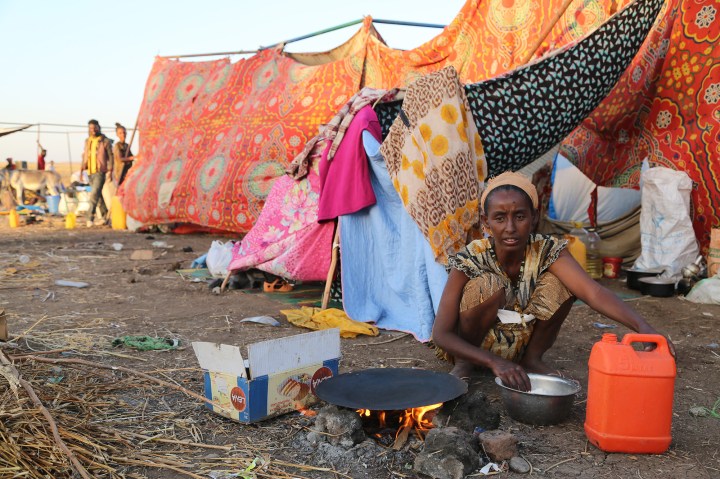DM168
Little hope of mediation in Tigray conflict, says Ethiopia

AU member states are likely to defer to the Ethiopian government’s view on the matter as many believe its line that the attacks are aimed at bringing a defiant regional government into line.
First published in Daily Maverick 168.
Ethiopians, weary from the long trek and carrying just a few belongings, have been streaming across the border into Sudan since 10 November, to escape the war that broke out in the country that hosts the African Union (AU) headquarters. The United Nations refugee agency (UNHCR) this week said the influx of refugees from Ethiopia into Sudan was “the worst that part of the country has seen in over 20 years”.
A media blackout means information about the war in the Tigray region is scarce and tightly controlled by the national government, but reports suggest that the Ethiopian National Defence Force has seized the towns of Shire and Axum and was advancing on the regional capital, Mekelle. The Tigray People’s Liberation Front (TPLF) has, however, vowed to continue fighting.
Prime Minister Abiy Ahmed, who won the Nobel Peace Prize last year for bringing about peace with neighbouring Eritrea, earlier this month launched attacks on the region’s forces after accusing the party in charge of the TPLF-controlled regional government of acting unconstitutionally and undermining the authority of the national government. This comes after the region, among others, organised its own elections in August, when Abiy postponed the country’s elections due to the Covid-19 lockdown, and for allegedly attacking a military base in Mekelle, a charge the TPLF denies.
Federal police this week issued arrest warrants for 76 army officers, accusing them of conspiring with the TPLF and “committing treason”, AFP reported. In what is considered by analysts to be part of a purge of prominent Tigrayans, AU Commission chair Moussa Faki Mahamat ordered the dismissal of the AU’s security head, General Gebre-Egziabher Mebratu, on 13 November at the request of the Ethiopian government.
Mahamat in a media statement said Gebre-Egziabher retired from the AU Commission on 30 June after reaching retirement age and was given a three-month short-term contract in an acting capacity while a successor was being recruited. In a letter to the AUC on 10 November, Ethiopia’s ministry of defence requested that Gebre-Egziabher be withdrawn from duty at the commission.
Mahamat said Gebre-Egziabher was appointed to his position at the AU in 2011 on recommendation of the Ethiopian government. The commission “is responsible for the safety and security of the personnel” and it was clear “this role cannot be entrusted to an individual, who remains a serving national military officer, and in whom his national hierarchy withdrew its full trust and support”.
Horn of Africa expert Rashid Abdi, however, told Reuters Gebre-Egziabher’s dismissal “plays into the notion that this is essentially an ethnic war masked as a centre-periphery power struggle”.
Mahamat was this week set to meet with AU chairperson President Cyril Ramaphosa to discuss the continental body’s response. The first port of call for addressing the conflict would have been the body’s Peace and Security Council, but Ethiopia is chairing it this month and insiders say it has “refused to convene” the council. Ethiopia considers the conflict to be a domestic matter and has so far refused outside efforts to mediate or to bring the warring parties to talks.
AU member states are likely to defer to the Ethiopian government’s view on the matter as many believe its line that the attacks are aimed at bringing a defiant regional government into line, rather than viewing both sides in this war as “belligerents”, an AU insider said. Foreign diplomats in Addis Ababa rely on the Ethiopian government for accreditation and protection, and this is said to be one of the reasons why it is difficult for them to speak out about the conflict.
South Africa has thus far been silent about the conflict, but it is likely that Ramaphosa would be keen to get involved to help silence the guns – the AU’s theme for this year – in the same way that he has played an important role in helping avert conflict about Ethiopia’s Great Renaissance Dam.
Mediation and negotiation could be off the table for now, according to Ethiopia’s ambassador to South Africa, Shiferaw Teklemariam Menbacho. Those who wanted to proceed to the negotiation table have to “respect the rule of law” first.
“This is very important for [the] international community to understand,” he says. Shiferaw says the region has crossed a red line by attacking the national defence force. DM168
You can get your copy of DM168 at these Pick n Pay stores.


















 Become an Insider
Become an Insider
Comments - Please login in order to comment.